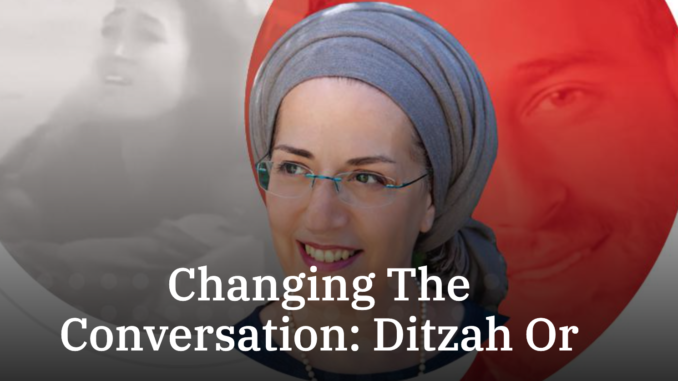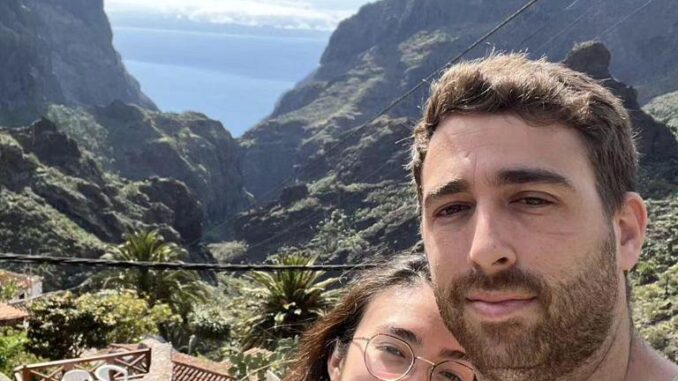E. Rowell: If you can bear to read or listen to a person in emotional pain, you will find that person is in a unique position to illuminate how one lives with grief, sadness, anger, while trying to keep hope alive. Also we can learn about the strength that can come from deepening our connection to The Eternal One. There are probably many similar conversations taking place amongst the people of Israel. It is important to honor each person struggling to come to grips with this personal and national devastation.
By Baila Olidort, LUBAVITCH.COM 24 May 2024

Millions of people have seen the video of Avinatan Or being taken hostage at the Nova Music Festival on October 7. He’s the thirty-one-year-old, handsome Israeli who, at six foot three, appears almost indifferent to the terrorists pushing and pulling him this way and that. His focus is turned to the pleading girl on the motorcycle crying out to him as terrorists ride off with her into Gaza. Avinatan looks over at his girlfriend, Noa, with pain in his eyes that seems to say, “I won’t leave you.”
More than four months after he was kidnapped, Ditzah Or still had no word of her son. It’s as if, she says, “he vanished into the darkness.”
A therapist who incorporates Kabbalah and Chasidic ideas in her practice, Ditzah spoke with me over the phone from her home in Shiloh, a community in the Benjamin region of Judea and Samaria. Every morning she steps out of her home, situated on a hill with an unobstructed view towards Gaza, and whispers messages of love and courage to her son.
How did you learn about your son’s kidnapping?
I was in Jerusalem with my mother at her home on Shabbat, October 7. When I went to lie down sometime in the afternoon, I heard footsteps outside. There had been red alerts earlier in the day, but my instinct told me not to investigate.
I then heard the voices of my son and daughter. They weren’t supposed to be in Jerusalem then, so I understood that something terrible happened. For a while, I refused to respond to their knocking at the door. I didn’t want to face my worst fears. But eventually, my children came in and told me what had happened. They heard about it from Avinatan’s best friend, who had seen the video on Instagram.
What did you feel as you heard that your son was taken into Gaza?
I collapsed. I couldn’t absorb what I heard. In Chasidic terms, my “vessels” could not contain the horror.
When my sons had gone off to serve in the army, I blessed them. They were committed to a holy mission, and I knew they’d be risking their lives. But there is one thing, I told them, that they must never allow to happen: “Never allow yourself to fall into captivity.” Those were always my parting words to them.
So you ask what came over me as I learned that my son was taken hostage? I felt my being dissolve into nothingness. I became undone, extinguished. All I remember of the rest of the day is that my mouth was terribly parched, and I kept drinking water—the body’s physical reaction I later learned, to such trauma.
My children tried to console me. They told me that Avinatan is seen in the video unharmed. Unlike so many others who were horribly brutalized, my son is seen walking in his full stature, which gave me some comfort. And they kept reminding me that it’s all in G-d’s hands now. That thought is what kept me then, and it keeps me going to this day.
In the video, it appears that your son could have broken free from the terrorists. He is clearly taller and stronger than they are.
Yes. We know that Avinatan had quite a few opportunities to get away before he was captured, but his girlfriend had been taken. He would never leave her behind and save himself. It’s not the kind of person he is. If he had done that, he’d have saved his body, but his soul would not survive.
It is, as of now, nearly five months since Avinatan has been kidnapped. Have you heard anything in all this time to know whether he is alive?
Nothing. He disappeared into the darkness.
You’ve spoken publicly and in the media on many occasions since October 7. You’ve taken a strong position on how Israel must negotiate the release of the hostages.
We must negotiate from strength, confidence, and courage. When you negotiate a challenge from a place of low confidence, intimidation, or fear, you defeat your own aims. We know that this is true from our personal experience of life in general. It is absolutely true now—we must come to these negotiations with the courage of our convictions. Our agenda must be driven by a deep connection to our inner truth.
So I believe that our focus must be on winning this war to defeat Hamas militarily, economically, and diplomatically. The more pressure they feel, the greater the chances that they will release all of our hostages.
Where do you draw your strength from now?
This war exposed the deep, inherent connection between us—the Jewish people—which isn’t always obvious. Family and friends and community have surrounded me with love. I draw strength from my spiritual resources, contemplative prayer and the study of Chasidut and Kabbalah.
I also draw strength from my son. In my dark, weak moments, I often feel Avinatan reassuring me. It works both ways. We give strength to each other.
Israeli soldiers, air force pilots, who were captured by Syria in the Yom Kippur war, came to speak to the families of the hostages. They told us that in captivity, they could sense when the morale of their loved ones back home was low. It is difficult not to get sucked into the darkness, so I work hard to stay positive, because I know that it affects my son.
Do you join the protests about the government’s handling of the hostage situation?
I don’t join any public protests. But I protest in the privacy of my own home.
 Credit: Instagram @bring_noa_and_avinatan
Credit: Instagram @bring_noa_and_avinatan
What does that look like?
I haven’t returned to my normal routines. Life does not go on as usual for me. I don’t cook, I don’t bake, I don’t do the ordinary household chores that I always did. Avinatan’s capture is not a one-time blow. It is every day, every hour, every minute. Because every moment that he remains in captivity, the danger to him becomes greater. Every day, his endurance is further tested. It doesn’t end.
I cannot accept this—there’s no way I can go back to my usual routines while my son is suffering.
Is this a protest against G-d?
I’m protesting what happened. I don’t protest against G-d. I cannot understand His reasons for what happened. But I haven’t rejected Him. He is still my best friend.
That seems an unusual way to relate to G-d. Where does the idea of G-d as your “best friend” come from?
G-d is Ein Sof—infinite. And as humans, we have various relational arrangements with Him:
He is our king and we are His subjects. A king has absolute power—He acts unilaterally and I don’t always understand His actions. I accept that. G-d is also our father and we are His children. A parent will do things that the child doesn’t appreciate, and the parent isn’t obligated to always explain what they are doing and why. I accept that.
But, we know from Song of Songs that G-d is our groom and we are His bride. A bride and groom are best friends, aren’t they?
As my best friend, what He’s done is unacceptable to me. So I get up every morning and I tell Him that this isn’t the way to behave with a friend.
And yet, I feel his light shining on me in so many ways. There’s been a lot of goodness that I am so grateful for. The people who have surrounded me have been so kind and helpful. Anything I need has been easily made available to me—in big and small ways. That tells me that G-d is with me. It’s as if He’s telling me, “Lean on me.”
You say that now, despite what has happened, despite your pain?
This is all so much larger than my own personal pain. Our people—the Jewish nation—are enduring a profound trial here, and it is larger than any of us can understand.
You are asking questions that touch on core issues. These are the questions we need to be exploring now. What happened on October 7 brought us to our knees, and it must change our discourse. We cannot go back to the way things were—the conversation needs to change. We need to refine our relationship with HaShem and elevate it to a greater plane.
We need to listen closely, to try to understand what this has come to teach us. Where are we meant to change, to grow—in our personal lives, in our faith, and in the collective life of the Jewish people?
G-d forbid that we should wish to go back to the way things were.
There’ve been numerous talks about an impending deal to bring the hostages home. How do you feel about that now, so many months since your son was taken hostage?
The talks, the deals, the politics, the manipulations . . . I don’t depend on any of it. We must do our part, of course. But it is ultimately all in G-d’s hands. I believed it on October 7, and I believe it today. My son will return the minute G-d decides to bring him home.
This article appears in the Spring/Summer 2024 issue of Lubavitch International, to subscribe to the magazine, click here.



Leave a Reply
You must be logged in to post a comment.